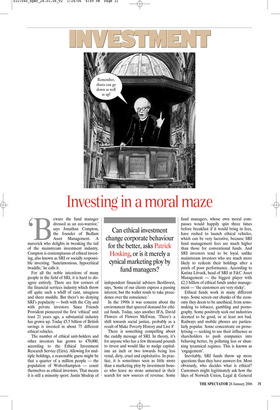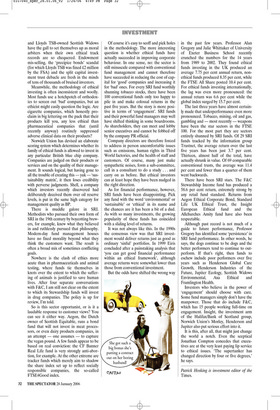Investing in a moral maze
Can ethical investment change corporate behaviour for the better, asks Patrick Hosking, or is it merely a cynical marketing ploy by fund managers? ‘B eware the fund manager dressed as an eco-warrior,’ says Jonathan Compton, the founder of Bedlam Asset Management. A maverick who delights in tweaking the tail of the mainstream investment industry, Compton is contemptuous of ethical investing, also known as SRI or socially responsible investing. ‘Sanctimonious, hypocritical twaddle,’ he calls it.
For all the noble intentions of many people in the field of SRI, it is hard to disagree entirely. There are few corners of the financial services industry which throw off quite such a whiff of cant, smugness and sheer muddle. But there’s no denying SRI’s popularity — both with the City and with private investors. Since Friends Provident pioneered the first ‘ethical’ unit trust 21 years ago, a substantial industry has grown up. Today £5.5 billion of British savings is invested in about 75 different ethical vehicles.
The number of ethical unit-holders and other investors has grown to 470,000, according to the Ethical Investment Research Service (Eiris). Allowing for multiple holdings, a reasonable guess might be that a quarter of a million people — the population of Wolverhampton — count themselves as ethical investors. That means it is still a minority sport: Justin Modray of independent financial advisers BestInvest, says, ‘Some of our clients express a passing interest, but the wallet tends to take precedence over the conscience.’ In the 1990s it was concern about the environment that spurred demand for ethical funds. Today, says another IFA, David Flowers of Flowers McEwan, ‘There’s a shift towards social justice, probably as a result of Make Poverty History and Live 8’ There is something compelling about the cuddly message of SRI. In theory, it’s for anyone who has a few thousand pounds to invest and would like to nudge capitalism an inch or two towards being less venal, dirty, cruel and exploitative. In practice, it is sometimes seen as little more than a marketing ploy by investment houses who leave no stone unturned in their search for new sources of revenue. Some fund managers, whose own moral compasses would happily spin three times before breakfast if it would bring in fees, have rushed to launch ethical vehicles, which can be very lucrative, because SRI fund management fees are much higher than those for conventional funds. And SRI investors tend to be loyal, unlike mainstream investors who are much more likely to redeem their holdings after a patch of poor performance. According to Karina Litvack, head of SRI at F&C Asset Management — the biggest player with £2.3 billion of ethical funds under management — ‘the customers are very sticky’.
Ethical funds work in many different ways. Some screen out chunks of the economy they deem to be unethical, from armsmaking to tobacco, gambling and pornography. Some positively seek out industries deemed to be good, or at least not bad. Railways and mobile phones are particularly popular. Some concentrate on proselytising — seeking to use their influence as shareholders to push companies into behaving better, by polluting less or shunning tyrannical regimes. This is known as ‘engagement’.
Inevitably, SRI funds throw up more questions than they have answers for. Most obviously, who decides what is ethical? Customers might legitimately ask how the likes of Norwich Union, Legal & General and Lloyds TSB-owned Scottish Widows have the gall to set themselves up as moral arbiters when their own ethical track records are so chequered. Endowment mis-selling, the ‘precipice bonds’ scandal (for which Lloyds TSB was fined £2 million by the FSA) and the split capital investment trust debacle are fresh in the minds of tens of thousands of bruised investors.
Meanwhile, the methodology of ethical investing is often inconsistent and woolly. Most funds use a hotchpotch of orthodoxies to screen out ‘bad’ companies, but an ethicist might easily question the logic. Are cigarette companies, which honestly proclaim in big lettering on the pack that their products kill you, any less ethical than pharmaceutical companies that (until recently anyway) routinely suppressed adverse clinical data on their products?
Norwich Union has devised an elaborate scoring system which determines whether its family of ethical funds is allowed to invest in any particular British blue chip company. Companies are judged on their products or services and on the quality of their management. It sounds logical, but having gone to all the trouble of creating this — yuk — ‘sustainability matrix’, it then loses credibility with perverse judgments. Shell, a company which investors recently discovered had deliberately deceived them over oil reserve levels, is put in the same high category for management quality as BP.
There is muddle galore in SRI. Methodists who pursued their own form of SRI in the 19th century by boycotting brewers, for example, knew what they believed in and ruthlessly pursued that philosophy. Modern-day fund management houses have no fixed morality beyond what they think the customers want. The result is often a broad mix of sometimes conflicting goals.
Nowhere is the clash of ethics more acute than in pharmaceuticals and animal testing, where funds tie themselves in knots over the extent to which the suffering of animals is justified to save human lives. After four separate conversations with F&C, I am still not clear on the extent to which its Stewardship funds will invest in drug companies. The policy is up for review, I’m told.
So is this sector opportunist, or is it a laudable response to customer views? You can see it either way. Aegon, the Dutch owner of Scottish Equitable, runs a bond fund that will not invest in meat processors, or even dairy products companies, in an attempt — one assumes — to capture the vegan pound. A few funds appear to be based on real conviction: the CF Banner Real Life fund is very strongly anti-abortion, for example. At the other extreme are tracker funds which merely aim to shadow the share index set up to reflect socially responsible companies, the so-called FTSE4Good index. Of course it’s easy to scoff and pick holes in the methodology. The more interesting question is whether ethical funds have actually succeeded in improving corporate behaviour. In one sense, no: the sector is still minuscule compared with conventional fund management and cannot therefore have succeeded in reducing the cost of capital for ‘good’ companies and increasing it for ‘bad’ ones. For every SRI fund worthily shunning tobacco stocks, there have been 100 conventional funds only too happy to pile in and make colossal returns in the past five years. But the story is more positive in terms of ‘engagement’. SRI funds and their powerful fund managers may well have shifted thinking in some boardrooms. As shareholders, they can meet and lobby senior executives and cannot be fobbed off by the company PR official.
Company directors are therefore forced to address in person uncomfortable issues such as emissions, human rights in Third World factories, and the health of staff and customers. Of course, many just make sympathetic noises, form a sub-committee, call in a consultant to do a study ... and carry on as before. But ethical investors can at least hope they have been nudged in the right direction.
As for financial performance, however, SRI funds have been disappointing. Pick any fund with the word ‘environmental’ or ‘sustainable’ or ‘ethical’ in its name and the chances are it has been a bit of a dud. As with so many investments, the growing popularity of these funds has coincided with a sliding level of returns.
It was not always like this. In the 1990s the consensus view was that SRI investment would deliver returns just as good as ordinary ‘sinful’ portfolios. In 1999 Eiris concluded after a painstaking analysis that ‘you can get good financial performance within an ethical framework’, although average returns were somewhat lower than those from conventional investment.
But the odds have shifted the wrong way in the past few years. Professor Alan Gregory and Julie Whittaker of University of Exeter Business School recently crunched the numbers for the 14 years from 1989 to 2002. They found ethical funds investing in the UK produced an average 7.75 per cent annual return, nonethical funds produced 8.35 per cent, while the FTSE All Share posted 10.4 per cent. For ethical funds investing internationally, the lag was even more pronounced: the annual return was 6.6 per cent while the global index surged by 15.7 per cent.
The last three years have almost certainly made that underperformance even more pronounced. Tobacco, mining, oil and gas, gambling and — most recently — weapons have been the star sectors in the FTSE 100. For the most part they are sectors entirely shunned by SRI funds. Of 29 SRI funds tracked by the information group Trustnet, the average return over the last five years has been just 3.7 per cent. Thirteen, almost half of the total, have actually shrunk in value. Of 69 comparable conventional trusts, the average was 11.4 per cent and fewer than a quarter of them went backwards.
There have been SRI stars. The F&C Stewardship Income fund has produced a 58.6 per cent return, extremely strong by any retail fund standard. Returns from Aegon Ethical Corporate Bond, Standard Life UK Ethical Trust, the Insight European Ethical fund and the Allchurches Amity fund have also been respectable.
Although past record is not much of a guide to future performance, Professor Gregory has identified some ‘persistence’ in SRI fund performance. In other words, he says, the dogs continue to be dogs and the better performers tend to continue to outperform. If that’s right, then funds to eschew include poor performers over five years such as Henderson Global Care Growth, Henderson Industries of the Future, Jupiter Ecology, Scottish Widows Environmental, Axa Ethical and Framlington Health.
Investors who believe in the power of ‘engagement’ should choose with care. Some fund managers simply don’t have the manpower. Those that do include F&C, which has 15 people working full-time on engagement. Insight, the investment arm of the Halifax/Bank of Scotland group, Norwich Union’s Morley, Henderson and Jupiter also put serious effort into it.
It is this, after all, that might just change the world a notch. Even the sceptical Jonathan Compton concedes that executives are at the very least paying lip service to ethical issues. ‘The supertanker has changed direction by four or five degrees,’ he says.
Patrick Hosking is investment editor of the Times.























































 Previous page
Previous page